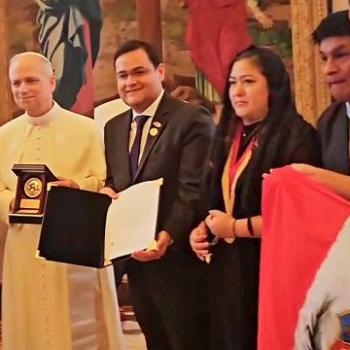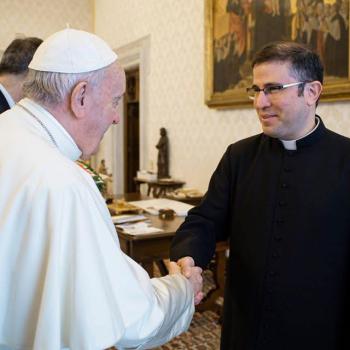 “Every family, despite its weaknesses, can become a light in the darkness of the world “(Amoris Laetitia, 66)
“Every family, despite its weaknesses, can become a light in the darkness of the world “(Amoris Laetitia, 66)
I read Amoris Laetitia with great anticipation. For several years now the Church has waited for this document which draws from the two synods on the family held in Rome, as well as the questionnaires on family issues sent by Rome to every single bishop of the world three years ago. The media, both Catholic and secular, has been reporting on Amoris Laetitia with a question in mind: what has the Pope given us in this document?
The best way to answer this question is to read the document. Its length may sound intimidating, over 250 pages, but the pages are brief. Here is my take on what the Pope has given us.
- The Pope has given us a rich, brief, and accurate catechesis on marriage. Drawing from Scripture and theological reflection, which includes John Paul II’s Theology of the Body, he presents us with a beautiful Christian understanding of marriage. He writes of the primordial divine plan clearly spoken by Christ himself, “Have you not read that he who made them from the beginning made them male and female?” (AL, 9).
- The Pope has given us a compassionate picture of the challenges marriages have always faced, and in particular the challenges they face in the modern age. These include: extreme individualism, the fast pace of life, stress, narcissism, pornography, immaturity, consumerism, overpopulation fears, decrease of faith life, loneliness, lack of proper housing, extreme poverty, media influence over children, migration, unrealistic high expectations, births out of wedlock, the mistreatment of women, ideology of gender, parents tired from work, families not sharing common meals, addiction to television, drugs, and the threat of many distractions. When considering the many challenges faced by families today, the Pope writes, “perfect families proposed by deceptive consumerist propaganda do not exist. In those families, no one grows old, there is no sickness, sorrow or death… Consumerist propaganda presents a fantasy that has nothing to do with the reality which must daily be faced by the heads of families” (AL, 135).
- The Pope has given us, in his words, a dose of self-criticism in the way we present our Christian beliefs regarding marriage. It is necessary to “find the right language, arguments and forms of witness that can help us reach the hearts of young people, appealing to their capacity for generosity, commitment, love and even heroism, and in this way inviting them to take up the challenge of marriage with enthusiasm and courage” (AL, 40). Rather than imposing rules by sheer authority when it comes to marriage, we must present a convincing, inviting, and motivating understanding of marriage that will attract young couples to marriage. He notes that oftentimes the procreative dimension of marriage overshadows its unitive dimension when the sacrament is discussed. He believes that “at times we have proposed a far too abstract and almost artificial theological ideal of marriage, far removed from the concrete situations and practical possibilities of real families” (AF, 39).”
- Pope Francis has given us a clear understanding that same-sex unions may not be equated with marriage. “No union that is temporary or closed to the transmission of life can ensure the future of society (AF, 52). Later in the document he writes, “as for proposals to place unions between homosexual persons on the same level as marriage, there are absolutely no grounds for considering homosexual unions to be in any way similar or even remotely analogous to God’s plan for marriage and family” (AF, 251). The Pope does emphasize that every person, regardless of sexual orientation, must be respected with dignity, avoiding any kind of discrimination including any kind of aggression or violence.
- Pope Francis has given us a reminder that families must be open to life. “I feel it urgent to state that, if the family is the sanctuary of life, the place where life is conceived and cared for, it is a horrendous contradiction when it becomes a place where life is rejected and destroyed.” (AF, 83). This is not only a reference to abortion, but also to euthanasia and the death penalty.
- Pope Francis has given us pastoral directives so the Church may better minister to all families. Many of these directives are already being practiced in the Church, but not by all ministers nor in all countries. Pope Francis encourages pastoral ministers to show love to those who participate in the life of the Church, even if it is in an imperfect manner. It is imperative to minister to them so they may receive the grace of conversion. Rather than rashly casting out those who are not married in the Church, we must see their interest in the Church as an opportunity to draw them closer to Christ, especially if the couple is “characterized by deep affection, responsibility towards marriage, and the ability to overcome trials” (AF, 78). In no way does the Pope change the teaching on marriage, he writes, “while clearly stating the Church’s teaching, pastors are to avoid judgements that do not take into account the complexity of various situations, and they are to be attentive, by necessity, to how people experience and endure distress because of their condition” (AF, 79).
- Pope Francis has given us a spectacular reflection on marriage based on Saint Paul’s first letter to the Corinthians, chapter thirteen.
- The Pope has given couples, especially those preparing for marriage, extensive advice. This includes detailed recommendations for parish marriage preparation programs which must be based on an accompaniment model where the whole Christian community assists in some way in the preparation of those about to be married, in particular mentor couples who have much wisdom to share. From my reading, I find that his best advice for couples is the following: “we… are a complex mixture of light and shadows. The other person is much more than the sum of the little things that annoy me. Love does not have to be perfect for us to value it. The other person loves me as best they can, with all their limits, but the fact that love is imperfect does not mean that it is untrue or unreal. It is real, albeit limited and earthly. If I expect too much, the other person will let me know, for he or she can neither play God nor serve all my needs. Love coexists with imperfection” (AF, 113).
- The Pope has given Humanae Vitae and Familiaris Consortio unquestionable authority when it comes to contraception. “The pastoral care of newly married couples must also involve encouraging them to be generous in bestowing life” (AL, 222). He mentions family planning, but making it clear that methods based on the “‘laws of nature and the incidence of fertility’ (Humanae Vitae, 11) are to be promoted, since ‘these methods respect the bodies of the spouses, encourage tenderness between them and favor the education of an authentic freedom.’”
- In the title of Chapter Eight, the Pope has given us a paradigm of how to minister to couples today: Accompanying, Discerning and Integrating Weakness. This includes a more compassionate approach when ministering to the divorced and remarried since they are not excommunicated from the Church (AF, 243). Immediately after mentioning this greatly anticipated topic of the divorced and remarried, he writes of the need to make annulment procedures more accessible and less time consuming, ideally free of charge. The Pope wants couples to make use of the tribunal structures already in place to regularize their marriages. He encourages priests to accompany the divorced and remarried since they have the duty to “help them to understand their situation according to the teaching of the Church and the guidelines of the bishop” (AF, 300). Citing what Saint John Paul II proposed as the “law of gradualness,” Pope Francis notes that we accomplish moral good in stages; it is impossible to fix everything in life in one day. Small steps in the right direction are already an enormous accomplishment (AF, 295). The Pope does not give a green light for the divorced and remarried to receive communion, yet he encourages them to enter into dialogue with their pastor so their consciences may be better informed in regards to the extent of their participation in the life of the church (which may, arguably, include reception of communion).
The Pope has given us a wide-reaching exhortation that lifts up the beauty of marriage while recognizing the challenges of married life. He has given the Church practical pastoral advice grounded on real problems and real solutions. He has given us great hope for the future of married life, reminding every couple that in their love and creative power they imitate the unity of the Holy Trinity, and that they have the Holy Family as an example to imitate as they share in their burdens.
Picture: Holy Family, by Juan Simon Gutierrez, public domain www.commons.wikimedia.org/wiki/File:HolyFamilybyGutierrez.jpg













